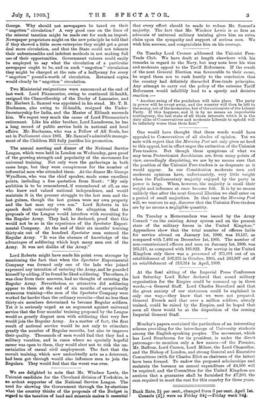Lord Roberts might have made his point even stronger by
mentioning the fact that when the Spectator Experimental Company was formed only one of the lads who joined expressed any intention of entering the Army, and he guarded himself by adding, if he found he liked soldiering. The others, it was clear from their answers, had no thought of entering the Regular Army. Nevertheless, so attractive did soldiering appear to them at the end of six months of exceptionally strenuous training—the men of the Spectator Company were worked far harder than the ordinary recruits—that no less than thirty-six members determined to become Regular soldiers. Yet it is seriously urged as an argument against universal service that the four months' training proposed by the League would so greatly disgust men with soldiering that very few would join the Regular Army. As a matter of fact, the first result of national service would be not only to stimulate greatly the number of Regular recruits, but also to improve their quality. Thousands of men would find that they had a military vocation, and in cases where no specially hopeful career was open to them, they would elect not to risk the un- certainties of casual civil employment. The fact that the recruit training, which now undoubtedly acts as a deterrent, had been got through would also influence men to join the Regulars. They would feel that the worst was over.














































 Previous page
Previous page